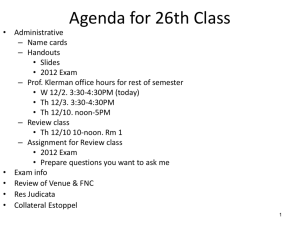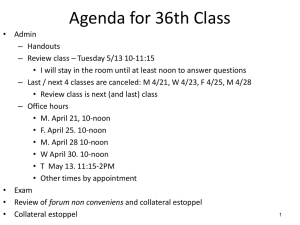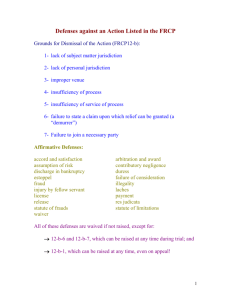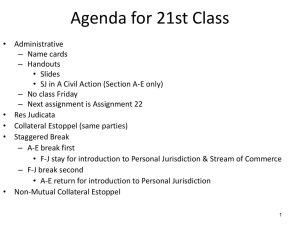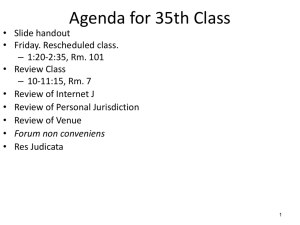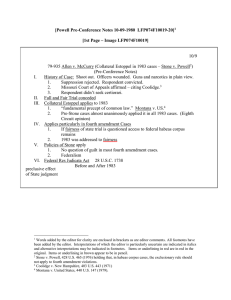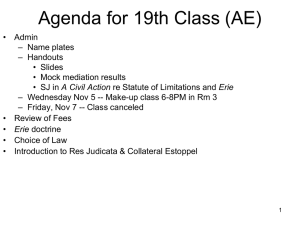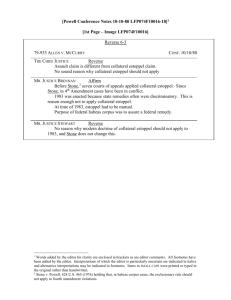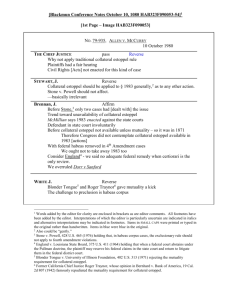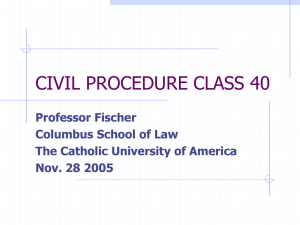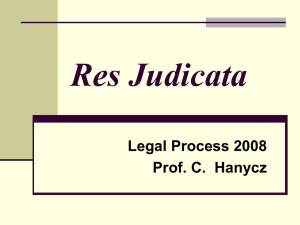Phillips
advertisement
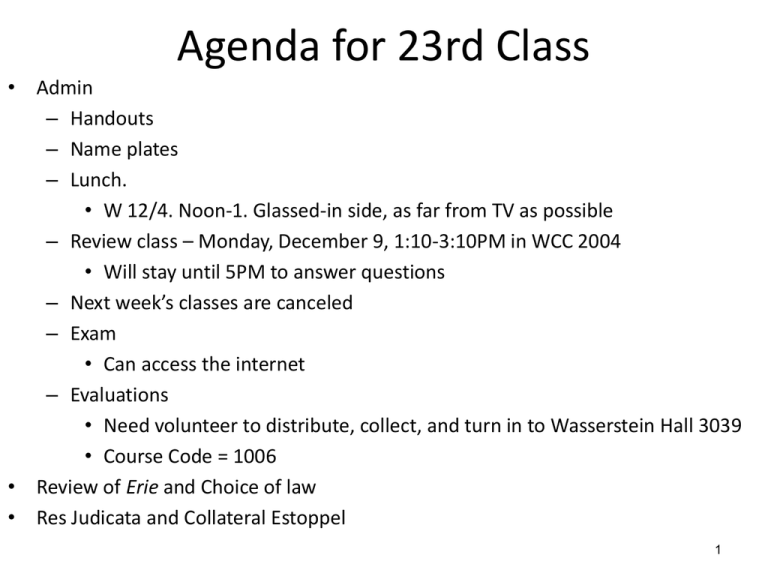
Agenda for 23rd Class • Admin – Handouts – Name plates – Lunch. • W 12/4. Noon-1. Glassed-in side, as far from TV as possible – Review class – Monday, December 9, 1:10-3:10PM in WCC 2004 • Will stay until 5PM to answer questions – Next week’s classes are canceled – Exam • Can access the internet – Evaluations • Need volunteer to distribute, collect, and turn in to Wasserstein Hall 3039 • Course Code = 1006 • Review of Erie and Choice of law • Res Judicata and Collateral Estoppel 1 Assignment for Review Class • 2012 Civ Pro Exam essay question (handout) • Any questions you want to ask 2 Study Tools • Glannon • iSites – Model Answers to 1995 Exam Questions – Class Notes / Model answers to class questions (61 pages) – 2011 exam and model answer – Recordings to all classes • www.klerman.com, “Civil Procedure” button – Slides for all classes – All old exams and model answers, except those on iSites • Office hours – M. 12/2. 3:30-6. Email for appointment – M 12/9. 10-12. Email for appointment – M 12/9. 3:10-5. After review session will stay to answer questions – Sunday 12/15. 9-5PM. By Skype • Email for appointment and include Skype name – More efficient to talk than to email • Can more easily follow up if don’t understand 3 Review of Erie and Choice of Law • Erie – Apply state substantive law in federal court in diversity cases – Apply federal procedure in federal court in diversity cases – Line between substance and procedure is not clear • Apply FRCP, as long as rule is “arguably procedural” – E.g. as long as rule is legitimate, which means always • Apply federal practices when doing so is consistent with purposes of Erie – Discourage forum shopping – Avoid inequitable administration of law – Modern trend is to apply federal practices • Choice of law – Traditional rules • Goal – simple rules that applied the same in every court • Torts – law of place where tort occurred – Usually place injury suffered – Restatement 2nd • Most significant relationship – Usually determined by examining policies underlying different state 4 laws • Hard to apply consistently and fairly Choice of Law Questions III • 7) Spend, a Nevada domiciliary, is completely irresponsible with money. Fortunately, he recognizes this fact and has set up a spendthrift trust. Under the terms of the trust, Spend cannot borrow money without the consent of Trustee, a friend he trusts. Spend goes to California and borrows money there from Sharkey to be repaid in one year at Sharkey’s place of business in California. When Spend doesn’t repay the loan, Sharkey sues Spend in Nevada. Under Nevada law, loans to someone who has set up a spendthrift trust are void. California law does not allow people to set up spendthrift trusts, so under California law, such loans are enforceable. The traditional rule for contracts was the law of the place the contract was formed governs disputes about contract validity. Under the traditional rule, what state’s law would apply? Under the Restatement Second, which state’s law should apply to the dispute? If the traditional rule and Restatement Second suggest different answers, which makes more sense? • 8) Same as (7), except Sharkey sues in California state court. • 9) Same as (8), except Sharkey traveled to Nevada, loaned Spend the money there, with repayment to be made to Sharkey when he returns to Nevada a year later. 5 Choice of Law Questions IV • 10) Same as (7), except the loan contract includes the following clause: “This contract shall be governed by California law.” The traditional rule was not to enforce choice of law clauses. See also Restatement (Second) below • § 187. Law Of The State Chosen By The Parties • (1) The law of the state chosen by the parties to govern their contractual rights and duties will be applied if the particular issue is one which the parties could have resolved by an explicit provision in their agreement directed to that issue. • (2) The law of the state chosen by the parties to govern their contractual rights and duties will be applied, even if the particular issue is one which the parties could not have resolved by an explicit provision in their agreement directed to that issue, unless either – (a) the chosen state has no substantial relationship to the parties or the transaction and there is no other reasonable basis for the parties' choice, or – (b) application of the law of the chosen state would be contrary to a fundamental policy of a state which has a materially greater interest than the chosen state in the determination of the particular issue and which, under the rule of § 188, would be the state of the applicable law in the absence of an effective choice of law by the parties. 6 Choice of Law Questions V • Plaintiff in Phillips brought the case in federal district court in Montana. Why is there a decision of the Supreme Court of Montana? • In Phillips, the Montana Supreme Court observes that “applying the law of the place of manufacture would be unfair because it would tend to leave victims under compensated as states wishing to attract and hold manufacturing companies would raise the threshold of liability and reduce compensation…. [A state with a high concentration of manufacturing] could enjoy all the benefits associated with liability laws which favored manufacturers in order to attract and retain manufacturing firms and encourage business within its borders while placing the costs of its legislative decision, in the form of less tort compensation, on the shoulders of nonresidents injured by its manufacturers’ products.” (p. 249). – Suppose Montana has a relatively low concentration of manufacturing. Would its citizens benefit by laws which raised the threshold of liability and reduced compensation? Or would its citizens benefit by laws which lowered the threshold of liability and increased compensation? If it lowered the threshold of liability and increased compensation, who would bear the increase in costs? What does this suggest about the fairness of applying Montana law? 7 Choice of Law Questions VI • In Phillips, the Montana Supreme Court asserted that “we do not believe that the purpose of any potentially applicable Michigan product liability law would be to regulate the design and manufacture of products within its borders. The purpose of product liability law is to regulate interstate sales or sales to residents and to set the level of compensation when residents are injured. ” (p. 249) – If the plaintiffs in Phillips had filed the case in Michigan state court, do you think Michigan state judges would have agreed that its laws are inapplicable? What purpose might a Michigan judge ascribe to product liability law to show that Michigan law should apply? • If you were a judge on the Montana Supreme Court, would you have retained the traditional lex loci commissi rule, or would you have voted (like the actual Montana Supreme Court) to adopt the Restatement (Second) most significant relationship approach? Why? 8 Introduction to Former Adjudication • 2 concepts – Res judicata / claim preclusion – Collateral estoppel / issue preclusion • Res judicata – Cannot litigate same claim several times – Sometimes bars related claim, even if not litigated before • Collateral estoppel – If issue resolved in one case, cannot relitigate that issue in subsequent case • Both doctrines motivated by similar policies – Finality – Save litigation costs – Avoid inconsistent judgments or verdicts 9 4 Requirements for Res Judicata • Same claim – Federal court. Claim arising out of the same transaction or occurrence • Even if claim in second suit not actually raised or litigated in first suit – Some state courts may apply narrower rules • E.g. claim in second suit arises out of “same evidence” • Judgment on the Merits – Trial, summary judgment, default judgment – 12(b)(6), but not equivalent dismissals in some states courts – NOT dismissal for lack of jurisdiction or venue • Final judgment – Judgment entered on all claims – In federal court, still final if appeal pending; not in some state courts • Same parties – Except judgment against former real property owner bars subsequent owner – Perhaps other exceptions when interests of parties are very closely aligned • But exception narrowed by Taylor v. Sturgell • Res judicata and choice of law – Apply res judicata rules of court which rendered judgment • Fed ct applies IL res judicata rules when deciding whether IL judgment bars federal litigation. Frier 10 Frier v City of Vindalia • City towed Frier’s cars • Frier sued city in in state court seeking replevin to get cars back – City won • Frier sued city in federal court alleging Due Process violation, because city did not give him a hearing before or after it took his cars – District court found for city on merits – 7th Circuit found for city on res judicata • Note that city defended appeal on grounds that raised, but lost in district court • Since 1st judgment was rendered by IL court, need to apply IL rules for res judicata, even though 2nd case in federal court – IL rules are narrower than federal rules – “same evidence” rather than “same transaction or occurrence” – Majority and concurrence differ in application • Yeazell p. 727 Q1 11 Collateral Estoppel Requirements • 1. Same issue • 2. Actually litigated. No C.E. if party admitted issue in first suit • 3. Actually decided. No C.E. if court resolved case without deciding issue – Can be hard to tell if jury verdict • 4. Necessarily decided / Essential to judgment – If changing result on issue would not change outcome of case, then no C.E. – If court decides negligence case by finding duty, but no negligence • No C.E. on duty • CE would not be fair to defendant, because could not have appealed finding of duty – If court decides contract case by deciding that there was no contract and that, even if there was a contract, there was no breach • Some courts follow Restatement 2nd – C.E. applies neither to “no contract” nor to “no breach” » Court may not have thought carefully about » Plaintiff may have thought appeal futile – Unless issue squarely decided on appeal • Other courts follow 1st Restatement and apply C.E. to both • Like res judicata, apply collateral estoppel rules of court which rendered first judgment 12 Collateral Estoppel Questions • Yeazell p. 750 Qs 1-3 • Illinois Central v Parks – Train collision – Suit 1. Jessie v. IL Central • Bertha ‘s claim. Compensation for injuries – Judgment. 30K • Jessie’s Claim. Loss of services and consortium – Judgment for defendant – Suit 2. Jessie v. IL Central for Jessie’s injuries • No c.e. on contributory negligence, because J for defendants could have been based on two findings – No damages in loss of consortium claim – Contributory negligence by Jessie • So neither essential, so c.e. on neither • So Jessie can relitigate whether he was contributorily negligent • Yeazell p. 753 Q 2 • Ruhrgas. – Fed Court dismissed, citing lack of subject matter J OR lack of personal J – Plaintiff refiled in state court • Yeazell p. 756 Qs 1-4 13 Nonmutual Collateral Estoppel I • Traditionally, collateral estoppel applied only when parties were the same in first and second suit (like res judicata) • Some court allow person not a party to the first suit to assert collateral estoppel, as long as person against whom c.e. asserted was in the first suit (and 4 other requirements satisfied) – Called nonmutual collateral estoppel • 2 kinds of nonmutual colleral estoppel – Defensive – Offensive • Defensive nonmutual collateral estoppel – Plaintiff sues defendant1 for patent infringement – Court decides that patent is invalid – Plaintiff sues defendant2 for patent infringement – Defendant2 can assert collateral estoppel against plaintiff • Because plaintiff already litigated and lost on issue of patent validity – Now accepted in nearly all jurisdictions – “defensive” means asserted by defendant 14 Nonmutual Collateral Estoppel II • Offensive nonmutual collateral estoppel – Plaintiff1 sues defendant for poisoning water – Court decides that defendant poisoned the water – Plaintiff2 sues defendant for poisoning the water – Defendant may be estopped from arguing that did not poison the water – Very controversial • If defendant loses one case (1st or 2nd or 99th case), would mean that defendant loses all subsequent related cases – But if one plaintiff loses case, then later plaintiffs not bound by c.e • Discourages joinder • Defendant may not have had incentive to litigate hard in first case – Federal courts have discretion to apply c.e. offensively. Factors: • Has there been inconsistent litigation outcomes? • Did plaintiff strategically wait (not join) so as to take advantage of offensive non-mutual collateral estoppel • Did defendant have sufficient incentive to litigate issue aggressively in first case – “Offensive” means by plaintiff • Yeazell pp. 764ff Qs 1c, 2a&b, 5a&b 15
